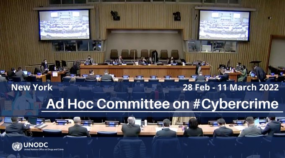Posted on 01 Apr 2017
Executive summary
There are numerous definitions of the informal economy. In this paper, an informal economy is defined as: “all economic activities by workers or economic units that are – in law or practice –not covered or sufficiently covered by formal arrangements”, includes legitimately-producedgoods and services that do not necessarily follow formal processes such as standards regulations, business registration or operational licenses. This form of trade is estimated to provide up to 70% of employment in sub-Saharan Africa, providing access to domestic goods and services that are not available through the formal economy, and bringing significant socio-economic benefits for those engaged in such activity. Governments typically disapprove of informal activity as it results in revenue losses, and the difficulty of regulating such activities can often lead to negative effects on overall economic growth.
Informal cross-border trade (ICBT) constitutes a major form of informal activity in most African countries. In the Southern African Development Community (SADC), for example, it makes up an estimated 30- 40 percent of total intra-SADC trade, with an estimated value of $17.6bn. Typically, women represent up to 70% of ICBT in the continent, trading a variety of commodities either in raw or semi-processed, including basic to luxury goods produced in other countries. In Western and Central Africa, women represent nearly 60% of informal traders. In these regions there is a high degree of avoiding formal border processes. It is mainly practiced by the unemployed, Small and Medium Enterprises and some large firms, and even formal worker desiring to supplement their salaries. As such, there is considerable overlap between informality and formality given the linkages between the two and the fact that there are formal firms which engage in informal trade and there are informal traders who are suppliers of the formal firms.
ICBT presents unique benefits to those engaging in such activities, but equally presents unique challenges. One of the key benefits is the employment creation potential. In Zimbabwe, where unemployment is estimated at up to 90% when considering only the formal economy, it has created significant employment opportunities, with an estimated 5.7-million people currently employed in the informal economy. This in turn has significantly alleviated poverty for both the employed and unemployed. In addition, profits generated from such informal trade are often employed to sustain families, providing for their healthcare and education.
More generally, ICBT provides access to goods that are unavailable domestically to meet domestic demand. As a matter of fact, ICBT has proven to be more responsive to shocks compared to formal trade especially in times of food crises. Traders are often forced to engage in informal trade because of barriers to entering the formal sector, including difficulty in getting access to traveling documents or trading licenses, excessively long waiting times at borders, overcharging by customs officials, and inadequate of knowledge of official procedures. Equally, due to the nature of this trade and the dirt of adequate legal framework, traders are often faced with unique challenges. These include corruption, where officials solicit bribes in order to smuggle goods, harassment, sexual abuse and confiscation of goods.
Governments are therefore typically concerned about the negative aspects of ICBT, which includes the fact that at times the informal imports present unfair competition to domestic industries — products traded informally are often counterfeit goods sold at lower prices, not subject to import taxes, and simply cheaper than locally manufactured equivalents. Informal trade represents a significant revenue loss for governments.
Beyond poverty and social issues, the prevalence of ICBT is closely related to business environment rigidities characterized by weaknesses in three institutional areas: taxation, regulation and private property rights. Punitive tax rates, tax administration and complicated business registration, licensing and inspection requirements are barriers that tend to prevent informal traders from formalizing their activities. Moreover, limited access to capital is an important constraint for operators working in the informal sector. Poor skills, education and training are also impediments to the formal sector in Africa. Other factors include limited access to technology and poor infrastructure. Although, the significant potential of Informal sector to economic growth has been recognized by many African countries, the informal sector doesn’t seem to be the proper attention it deserves on the development agenda of African countries or their multilateral development partners.
By addressing challenges related to ICBT, both traders and governments stand to benefit. For traders, a more secure operating environment will likely lead to greater trade and higher incomes; while for governments, increased revenue will benefit countries as a whole. One way to achieve this is through formalisation of the informality i.e., bringing informal traders into the formal economy, which can be done through simplifying legislation and regulations governing trade, as well as educating traders on formal procedures.
The different regional economic communities in Africa (RECs) can learn from each other and so can different African countries learn from each other the various approaches that have successfully been implemented towards promoting the transition to formality. For instance, the Common Market of East and Southern Africa (COMESA) and the East African Community (EAC), where significant attention has been given to formalizing cross-border trade provide a good case study to both SADC and ECOWAS. One measure has been the establishment of simplified trade regimes (STR), which simplify the rules and procedures for small traders and provide tax incentives for trading within the formal sector. In the ECOWAS region, the “brown card” allows vehicles to move free by providing mutual recognition and acceptance of insurance across the region. Some countries like Uganda, Rwanda, Liberia and Ghana cater expressly for the needs of small-scale traders within the countries and at their borders, by providing them with necessary market information, promoting direct engagement with informal cross-border trade representatives, linking them directly with the international markets and ensuring their needs are considered when policies and legislation are developed. A number of case studies in these areas have been presented in this report that will further highlight the lessons learnt and successes achieved.
However, as most of these networks and information platforms are donor-driven, their content reflects more the priorities of the donors, rather than that of the country or region concerned. In most cases, they often provide information in the context of industrial country market structures and operations with very poor understanding of the nature of the social networks that are froth in both urban and rural African markets.
Ultimately, as there are different rationales for operating in informal trade, approaches to formalisation also differ and are many. This study has recommended a categorization approach to incorporate the heterogeneity of solutions that one could possibly come across into four approaches to formalisation, namely, Policy and legislation approaches to formalisation, Partnership-based approaches, Rights-based approaches, and, Incentives and compliance based approaches. It is important to note that none of these is superior to the other; rather, they complement each other and it is possible that they can all be pursued at the same time in the same country. What is more important is that there’s need for a tailored or variegated approach towards facilitating formalisation based on country context and resources as well as partnerships that a country can avail for any approach.



